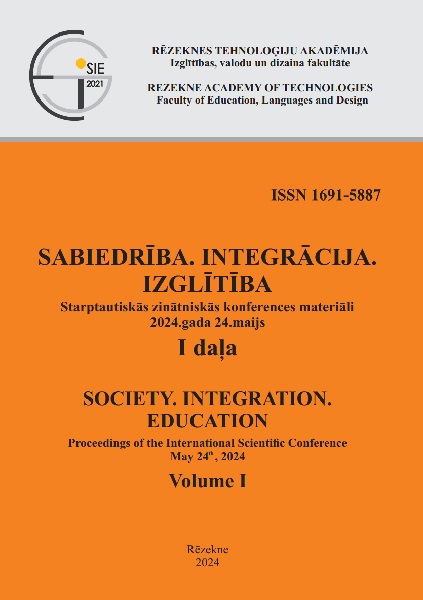THE IMPORTANCE OF TEACHERS` LEADERSHIP SKILLS DEVELOPMENT FOR SUCCESSFUL ORGANIZATIONAL CULTURE IN EDUCATIONAL INSTITUTION
DOI:
https://doi.org/10.17770/sie2024vol1.7920Keywords:
growth of every employee, leadership skills, teacher, organizational culture in educational institution, openness to changeAbstract
Discussions of the quality and effectiveness in education have become topical today. There are different challenges faced by teachers and school leaders at the primary, lower secondary, secondary and upper secondary levels. Therefore, it must be recognised that leadership skills are becoming important for the successful organisation of learning at all stages of education. The relevance of leadership skills is accentuated by the rapidly changing environment of change that also characterises the field of education. In the 21st century, leadership can be associated as a pedagogical and a managerial skill. Leadership skills and openness to change contribute to the growth of an educational institution, and this growth is at the heart of a successful organisational culture. It fosters a genuine concern for the growth of every employee, as well as an institution-driven vision, coherence, ownership, mentoring, accountability and support. These are employees with developed leadership skills who change and transform the system, because no organisation can exist without change. The aim of this publication is to describe and evaluate the impact of leadership skills and openness to change on the development of a successful organizational culture in the educational institution, and to highlight the need for the development of teachers` leadership skills.
References
Bass, B.M. (2008). The Bass handbook of leadership: Theory, research and managerial applications. New York: Free Press.
Bolkan, S., Goodboy, A. (2009). Transformation leadership in the classroom: Fostering student learning, student participation, and teacher credibility. Journal of Instructional Psychology, 36(4), 296-306.
Branch, F.B., Hanushek, E.A., Rivkin, G. (2013). School Leaders Matter.Winter. Vol.13, No.1. Retrieved from: https://hanushek.stanford.edu/sites/default/files/publications/Branch%2BHanushek%2BRivkin%202013%20EdNext%2013(1).pdf
Brown, M.K. (2006). Leadership for social justice and equity: Evaluating a transformative framework and andragogy. Educational Administration Quarterly, 42(5), 700-745.
Douglass, A.L. (2019). Leadership for quality early childhood education and care. OECD Education Working Papers No. 211.
Dudareva, I. (2018). Informācijas tehnoloģijas mācīšanās iedziļinoties atbalstam. Mācīšanās lietpratībai. (189-211). Rīga: LU Akadēmiskais apgāds. DOI: 10.22364/ml.2018.8.
Hafsari, A.S., Aslamiah, & Rachman, A. (2021). The Influence of the Transformational Leadership of Kindergarten Heads, Job Satisfaction, Work Spirit of Work on the Performance of Kindergarten Teachers in the Pelangi Cluster, South Banjarmasin District. Journal of K6 Education and Management, 3(4), 486-495. DOI: https://doi.org/10.11594/jk6em.03.04.08
Hallowell, E.M. (2011). Using brain science to get the best from your people. Boston, MA:Harvard Business Review Press
Herrity, J. (2022). A Complete Guide to Organizational Culture and Leadership. Updated October 20. Retrieved from: https://www.indeed.com/career-advice/career-development/organizational-culture-and-leadership
Kangas, J., Venninen, T. & Ojala, M. (2015). Distributed leadership as administrative practice in Finnish early childhood education and care. Educational Management Administration & Leadership, Vol. 44/4, pp. 617-631. DOI: http://dx.doi.org/10.1177/1741143214559226
Kapur, R. (2022).Understanding the Goals of Educational Leadership. The Journal of Social Sciences Studies and Research, Volume 02, Issue 03, Pages: 105-113.
Mārtinsone, K., Pipere, A., & Kamerāde, D. (2016). Pētniecība. Teorija un prakse. Rīga: RaKa.
Mezirow, J. (1991). Transformative Dimensions of Adult Learning. San Francisko: Jossey – Bass.
Mlinarević, V., Tokić Z.R., Cvjetičanin, A. (2022). A Model of Transformational Leadership in the Organisational Culture of Preschool Institution. CEPS Journal, Vol.12, No 3 (103-126).
Montuori, A., Donnelly, G. (2018). Transformative Leadership. Handbook of Personal and Organizational Transformation. Publisher: Springer. DOI: 10.1007/978-3-319-29587-9_59-1
Stoll, L., Fink, D. (1996). Changing our schools: Linking school effectiveness and school improvement. Open University Press.
Tokić, Z.R. (2022). Preschool teachers, primary school teachers and university instructors’ perceptions on organizational culture in educational institutions. Nova prisutnost, 20, 1, 117-131. DOI: 10.31192/np.20.1.8
Warren, L. (2021). Teacher Leadership Begins with Self-Leadership. Teacher Education and Curriculum Studies, 6(1):1 DOI: 10.11648/j.tecs.20210601.11
Wong, D. (2015). Mentoring in early childhood settings: an exploration of experiences of early childhood staff in Singapore. In M. Waniganayake, J. Rodd, & L. Gibbs (Eds.), Thinking and learning about leadership: early childhood research from Australia, Finland and Norway (49-63). Community Child Care Co-operative.
Xu, Y. , Patmor, G. (2012). Fostering Leadership Skills in Pre-Service Teachers. International Journal of Teaching and Learning in Higher Education, Volume 24, Number 2, 252-256.
Yeboah, A. K., James W. (2012). Transformational Teaching Experience of a Novice Teacher A Narrative of an Award-Winning Teacher. DOI: 10.1177/1045159512457354.






